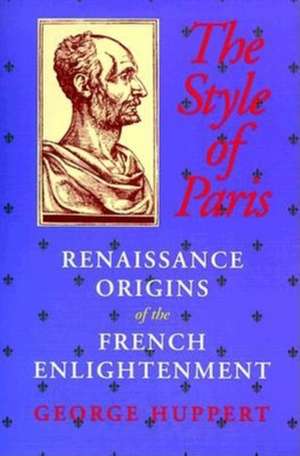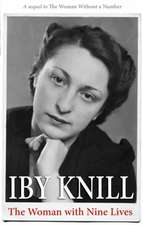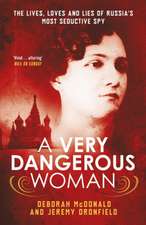The Style of Paris – Renaissance Origins of the French Enlightenment
Autor George Hupperten Limba Engleză Paperback – 21 mai 1999
Preț: 120.50 lei
Nou
Puncte Express: 181
Preț estimativ în valută:
23.06€ • 24.12$ • 19.15£
23.06€ • 24.12$ • 19.15£
Carte tipărită la comandă
Livrare economică 03-17 aprilie
Preluare comenzi: 021 569.72.76
Specificații
ISBN-13: 9780253212740
ISBN-10: 025321274X
Pagini: 160
Dimensiuni: 156 x 233 x 12 mm
Greutate: 0.24 kg
Editura: MH – Indiana University Press
ISBN-10: 025321274X
Pagini: 160
Dimensiuni: 156 x 233 x 12 mm
Greutate: 0.24 kg
Editura: MH – Indiana University Press
Cuprins
1. Portrait of a Discrete Philosophe
2. In Monsieur BrinonÕs Garden
3. A School for Scandal
4. Libert, Egalit, Fraternit
5. Historical Research in the Service of Philosophy
6. Optimi Auctores
7. Dangerous Classes
8. Ex Tenebras Lux
9. The Republic of Letters
Notes
Bibliography
Index
2. In Monsieur BrinonÕs Garden
3. A School for Scandal
4. Libert, Egalit, Fraternit
5. Historical Research in the Service of Philosophy
6. Optimi Auctores
7. Dangerous Classes
8. Ex Tenebras Lux
9. The Republic of Letters
Notes
Bibliography
Index
Recenzii
"Huppert makes a vigorous and effective case in The Style of Paris for the existence around the 1550s of a dynamic group of mainly young intellectuals whose spirit of scepticism and rational inquiry anticipated the Enlightenment."--David Parker, Times Literary Supplement, September 17, 1999
Notă biografică
GEORGE HUPPERT is Professor of History at the University of Illinois at Chicago. He is author of The Idea of Perfect History: Historical Erudition and Historical Philosophy in Renaissance France, Les Bourgeois Gentilhommes: An Essay on the Definition of Elites in Renaissance France, Public Schools in Renaissance France, and After the Black Death: A Social History of Early Modern Europe, 2/e.
Textul de pe ultima copertă
In his latest book, George Huppert introduces the reader to a group of talented young men, some of them teenagers, who were the talk of the town in Renaissance Paris. They called themselves philosophes. They wrote poetry, they studied Greek and mathematics -- and they entertained subversive notions about religion and politics. Though classically trained, these men wrote in French to reach the widest possible audience. In time these young radicals learned to speak more softly, out of prudence, but they were heard clearly enough to foster a succession of disciples who continued to express confidence in the eventual enlightenment of humankind. Huppert argues that all attempts to suppress this movement failed because the program of the early philosophes and of their successors was deeply embedded in the classical educational system devised in the 1520s, the so-called ""style of Paris."" In the sixteenth century, these schools existed in such profusion and were so free of clerical or state interference that they became the foundation of a new culture which stood in direct opposition to age-old pieties.
Through a series of portraits, Huppert presents the essential traits of this new culture. The teachers, lawyers, scientists, and priests called on here to illustrate the philosophes' outlook are little-known figures, for the most part, but their legacy is substantial. To demonstrate their importance, Huppert sets the mature reflections of eighteenth-century ideologues such as Kant, Voltaire, and Jefferson against the background, not of occasional precursors, but of an entire culture ineradicably permeated by revolutionary ideas born in the classrooms and the bookshops of Renaissance Paris.
Through a series of portraits, Huppert presents the essential traits of this new culture. The teachers, lawyers, scientists, and priests called on here to illustrate the philosophes' outlook are little-known figures, for the most part, but their legacy is substantial. To demonstrate their importance, Huppert sets the mature reflections of eighteenth-century ideologues such as Kant, Voltaire, and Jefferson against the background, not of occasional precursors, but of an entire culture ineradicably permeated by revolutionary ideas born in the classrooms and the bookshops of Renaissance Paris.
Descriere
The voices of liberty, equality, religious tolerance, reason, and enlightenment heard in renaissance Paris.













